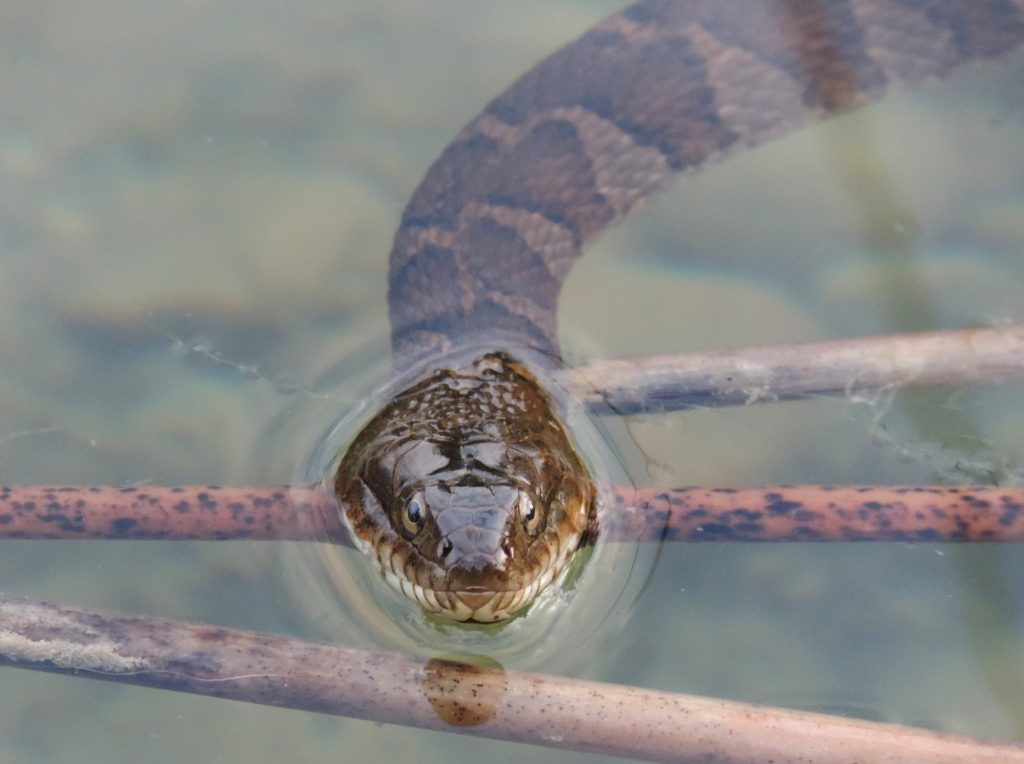Are Water Snakes Poisonous or Dangerous? If you live near a body of water, there’s a good chance that you’ll run into all kinds of wildlife. Most creatures are generally harmless and are looking for water, but over time you will likely come across snakes as well. Northern water snakes are non-venomous, which means they’re not poisonous or dangerous. They can still bite if cornered though, so be careful and keep your distance. Water snakes usually kidnap their prey and swallow it whole by waiting for the animal to pass by with their mouths wide open before closing in.
Water Snake Bites
Despite their aggressive reputation, water snakes are not venomous. If a water snake comes across you while swimming, playing, or anything else they tend to hiss in an attempt to defend themselves. When they flatten their bodies and mouths, it means they are ready to strike and bite viciously. A water snake bite will typically not involve fangs or venom glands as these two features are lacking in this species of snake.
Are Water Snakes Dangerous to Humans?
A water snake’s bite will leave telltale signs that are unique to the species. These bites can be found where there would be multiple teeth marks, all of which would have the same diameter. The rows of tiny teeth do more than just cause bruising like other snakebites, as they have anticoagulants in their saliva.
Anticoagulants prevent blood clotting within their prey, resulting in much more bleeding than if you were attacked by a typical water snake with smaller fangs. These proteins may cause a hazard to any creature that the snake is preying on, such as spiders and small animals. Fortunately, their anticoagulants pose little risk to larger animals or humans–so being bitten by these guys generally isn’t going to kill you!
Are Water Snakes Poisonous?
Most snakes are not dangerous to humans, and water snakes are no exception. Water snakes aren’t generally dangerous because they lack the fatal venom that can be found in other snakes. Like other non-venomous snakes, they’ll most likely escape or swim away as a primary option. As with all non-venomous snakes, there is no reason to be afraid of them getting out of their natural line of food, which includes humans.
However, these climes can become aggressive when they sense danger or if they’re touched. For this reason, water snakes are not suitable as pets. When approached, it’s best to maintain a distance and retreat unless it’s clear they’re seeking food or trying to take care of their needs. Unless handled incorrectly, water snake bites tend to produce pain and swelling around the wound and might even lead to an allergic reaction if handled poorly – just like any other snake bite!
Water Snakes’ Habits and Diet
Water snakes are not poisonous; however, they can be mistaken for the deadly cottonmouth snake, also called the water moccasin. Knowing the difference between a harmless water snake and a water moccasin is critical to avoiding unnecessary danger.
Examining their heads and necks is an effective method to tell them apart. Water moccasins have blocky bulky heads and thick stocky bodies for their length, with a prominent neck. They are known for their ‘cotton mouth’ because the inside of their mouths turn white as part of defense mechanism in order to reveal it when threatened. On the other hand, water snakes have a round head, long slim body, and less distinctive neck–another evolutionary adaptation that could explain why they sometimes are mistaken for one another.
How to Avoid Water Snake Bites
As the saying goes, you can’t have your cake and eat it too. Northern water snakes, like many other carnivorous animals, hunt and eat meat fresh off the bone. And by eating fresh meat off the bone, they further their aim at slashing up their food and devouring it before it even gets a chance to smell them coming.
This is exactly why when they reach a length of around 1.5 feet (45 cm) they switch from fish to larger prey like salamanders and toads. Smaller water snakes will continue to eat smaller creatures as well though, such as fish because unlike northern water snakes, these small aquatic predators don’t overwinter in chilly climates like the cold-blooded reptile does.
Discover the “Monster” Snake 5X Bigger than an Anaconda
Water snakes flatten their bodies and open their jaws, preparing to bite. If you see this happening, get as far away from the snake as possible, and always remember that they can bite underwater if provoked or if they feel uncomfortable. It is best to assume that every water snake is venomous for safety purposes.
Want to learn about more amazing facts? Subscribe to our newsletter for some of the most interesting snake facts and stories you’ll find. We send out some of the most fascinating information for free, and all you have to do is sign up for your first issue today.








